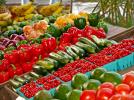AQUALIA Operational Group: Deficit irrigation scheduling system for organic horticultural crops based on highly configurable IoT virtual sensors and Artificial Intelligence with Software Product Lines
- Type Operational group
- Status In progress
- Execution 2023 -2025
- Assigned Budget 298.790,00 €
- Scope Autonómico
- Autonomous community Andalucía
The AquaIA project aims to develop an advanced deficit irrigation scheduling system for organic horticultural crops, using IoT sensors, satellite images, and Artificial Intelligence (AI). The main expected results include a tool that optimizes irrigation water use, adjusting it to the needs of each crop and improving sustainability.
A reduction in water consumption of at least 20% is expected without significantly affecting production, which translates into cost savings, primarily in terms of energy and water resources. Among the main practical recommendations, the advantage of being able to manage irrigation more efficiently, even in situations of water scarcity, stands out, which will improve farm profitability.
Farmers will be able to take advantage of the technology without advanced knowledge, thanks to its "no-code" setup, which facilitates adoption. Furthermore, the use of virtual sensors will reduce the initial implementation cost, making the solution accessible to farms of various sizes.
The added value for agricultural professionals lies in the possibility of improving competitiveness, reducing production costs, and ensuring long-term sustainability, especially in regions affected by drought.
The project includes four main activities:
- Data collection using IoT sensors and satellite images.
- Development of a predictive analysis system for irrigation scheduling.
- Testing and piloting of the system in a real-life environment on an organic farm.
- Dissemination of results and best practices to farmers and stakeholders, ensuring the technology's scalability and adoption.
The project responds to the growing water scarcity facing the agricultural sector, driven by climate change and regulatory requirements for sustainable water management. The legal framework in regions like Andalusia emphasizes the efficient use of resources, positioning this project as a solution to improve productivity while complying with environmental laws.
The project addresses the problem of water scarcity in horticultural production by developing a configurable system that integrates IoT, Artificial Intelligence (AI), and satellite data for deficit irrigation scheduling. By offering real-time data analysis and predictive analytics, the solution optimizes water use, reduces costs, and ensures sustainable agricultural practices, enabling users to manage irrigation efficiently and address environmental challenges.
The main expected results include a tool that optimizes irrigation water use, adjusting it to the needs of each crop and improving sustainability. A reduction in water consumption of at least 20% is expected without significantly affecting production, which translates into cost savings, primarily in terms of energy and water resources.
- Coordinator/entity name: Rosa Iglesias
- Postal address: vtransferencia@us.es
- Coordinator/entity email: vtransferencia@us.es
- Telephone: 954481174
The project complies with regional guidelines, such as the Andalusian Rural Development Program (RDP), and contributes to national sustainability goals. It is closely aligned with the European Union's strategies for the digital transformation of agriculture, integrating AI and IoT for more sustainable farming practices.
Key enablers of the project include the existing IoT infrastructure (FIWOO platform), the platform's no-code approach, and the application of product lines to facilitate crop adaptability, thereby reducing adoption barriers. Future research could focus on expanding the use of virtual sensors for greater scalability and applicability across different crops. A potential challenge remains the initial investment required by farmers, which could be mitigated through funding or grants.
- Rosa Iglesias
- Manuel Felipe (vtransferencia@us.es)
- Rosa Iglesias







